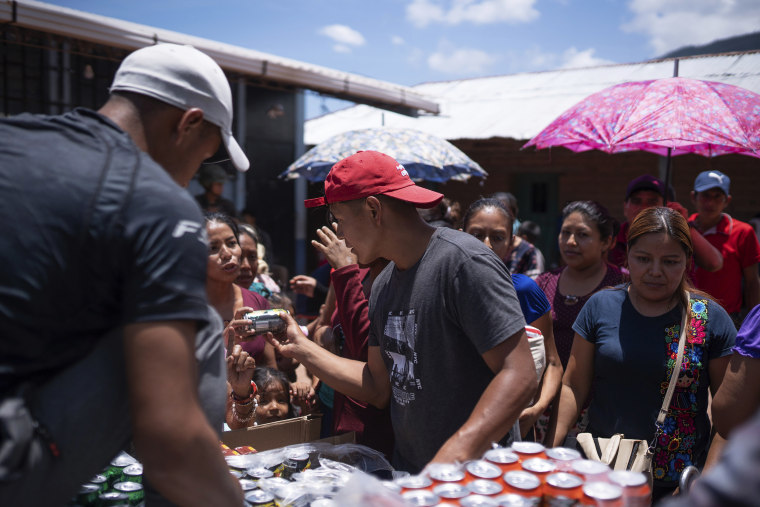Mexicans flee to Guatemala after drug cartel shootouts
When a 72-year-old Mexican farmer heard the bullets from the most recent cartel shootout landing close to his home, he knew it was time to go. He collected his children and grandchildren and fled on foot across the border to Guatemala.
They left behind their animals, documents, money and took off running, among nearly 600 people who fled various communities of Amatenango la Frontera this week to escape warring drug cartels that have terrorized the rural borderlands of southern Mexico.
“I left my home because of the shooting, and out of fear,” said the farmer, who requested anonymity for his family’s safety. “The cartels kill even the innocent.”
They walked more than 2 miles (4 kilometers) over the mountains and through thick brush until they found a path that brought them to Ampliacion Nueva Reforma, an impoverished Guatemalan hamlet in the Cuilco municipality.
In this single community, more than 200 Mexican refugees have arrived in recent days. Locals have scrambled to shelter them in their modest school and collect donations of food and water.
“Thank God they gave us a hand, gave us a tea to calm our fear,” the man said. “We’re afraid to return. There’s no authority to fight them. What we ask of the government is to intervene and help us out and send the Mexican army.”

Guatemalan President Bernardo Arévalo said Wednesday his administration would coordinate the humanitarian response though there was little sign of it yet. Still, that was more than came from the Mexican side where authorities did not respond to requests for comment about the situation and President Andrés Manuel López Obrador did not even mention it during his daily briefing Thursday of more than three hours.
A 42-year-old woman who identified herself only as Karla to protect her family, said she fled Sunday with her four children.
“With the shootouts you couldn’t leave your home to look for food, imagine what I could give my children to eat,” she said. “We don’t know how much longer this is going to last. We don’t know if we’ll be able to return.”
Noel Pérez, mayor of Ampliacion Nueva Reforma, was preparing for what might be an extended stay. He said the refugees needed basic supplies, hygiene products and a large tent. “So far, not the mayor (of Cuilco), nor the government has given us help and it’s urgent that they they attend to these people.”
Catholic Church leaders in southern Mexico made their own plea for the Mexican government to protect the communities from cartels, which extract protection payments and use locals as human shields.
A letter dated Wednesday and signed by Bishop Emeritus Jaime Calderón of the Tapachula Diocese, which includes parishes near the border with Guatemala, begged for government help.
Two of Mexico’s most powerful cartels from the northern states of Sinaloa and Jalisco have been battling for control of smuggling routes in the area for more than a year causing multiple displacements.
On Wednesday, Arévalo said his administration was coordinating with the local governments near the border to attend to the Mexicans “who are escaping conflict between groups that is taking place on the Mexican side.”
A Guatemalan government report obtained by The Associated Press described accounts from the refugees of having to abandon their homes because of a lack of food and fighting between organized crime groups. They arrived in communities of the Cuilco municipality. Among the 580 people were men, women, children and elderly.
The diocese’s letter says communities long mired in poverty and ignored by the government must now also suffer being “hostages in their communities, paying extortion to the corresponding cartel based on where they live, being forced to take shifts at roadblocks that impede free transit.”
Residents have to use what little money they have to pay for scarce items at elevated prices because the shopkeepers also are being extorted. And between July 20-22, the situation worsened as residents were “intimidated, threatened and forced to be human shields in the clashes between drug cartels.”
The letter does not refer specifically to those who fled to Guatemala, but it said that while Mexico’s military and National Guard are present, they do nothing to intervene to protect the communities.
“What do we have to do or say so that the government carries out its duty, at least, to protect and watch out for the security of the communities?” the letter asks.
In June, some 5,000 people were displaced by violence in another part of Chiapas after armed men set houses on fire in the town of Tila.
In September of last year, Mexico’s president conceded the cartels had cut off electrical power in some Chiapas towns near the border with Guatemala, and forbidden government workers from coming in to the largely rural area to fix power lines.
On Thursday, the Mexican government’s silence continued.




